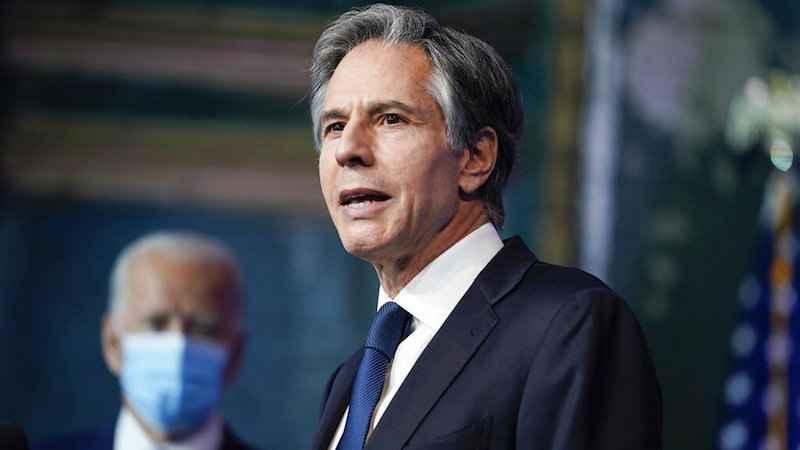US, China spar in first face-to-face meeting of Biden admin

In this Nov. 24, 2020, file photo President-elect Joe Biden listens as his Secretary of State nominee Tony Blinken speaks at The Queen theater in Wilmington, Del. President-elect Joe Biden’s national security Cabinet may be bare on Day One of his presidency. His nominees to head the State Department, the Pentagon, the Department of Homeland Security and the intelligence community are facing a series of confirmation hearings starting on inauguration eve.[AP Photo/Carolyn Kaster, File]
Top U.S. and Chinese officials offered sharply different views of the world on Thursday as the two sides met face-to-face for the first time since President Joe Biden took office.
In unusually pointed remarks for a staid diplomatic meeting, Secretary of State Antony Blinken and Chinese Communist Party foreign affairs chief Yang Jiechi took aim at each other’s countries’ policies at the start of two days of talks in Alaska. The contentious tone of their public comments suggested the private discussions would be even more rocky.
The meetings in Anchorage were a new test in increasingly troubled relations between the two countries, which are at odds over a range of issues from trade to human rights in Tibet, Hong Kong and China’s western Xinjiang region, as well as about Taiwan, China’s assertiveness in the South China Sea and the coronavirus pandemic.
Blinken said the Biden administration is united with its allies in pushing back against China’s increasing authoritarianism and assertiveness at home and abroad. Yang then unloaded a list of Chinese complaints about the U.S. and accused Washington of hypocrisy for criticizing Beijing on human rights and other issues.
"Each of these actions threaten the rules-based order that maintains global stability," Blinken said of China’s actions in Xinjiang, Hong Kong and Taiwan, and of cyber attacks on the United States and economic coercion against U.S. allies. "That’s why they’re not merely internal matters, and why we feel an obligation to raise these issues here today."
Yang responded by demanding the U.S. stop pushing its own version of democracy at a time when the United States itself has been roiled by domestic discontent. He also accused the U.S. of failing to deal with its own human rights problems and took issue with what he said was "condescension" from Blinken, national security adviser Jake Sullivan and other U.S, officials.
‘There is no way to strangle China," he said.
U.S.-China ties have been torn for years, and the Biden administration has yet to signal whether it’s ready or willing to back down on the hard-line stances taken under Donald Trump.
Just a day before the meeting, Blinken had announced new sanctions over Beijing’s crackdown on pro-democracy advocates in Hong Kong. In response, China stepped up its rhetoric opposing U.S. interference in domestic affairs.
Trump had taken pride in forging what he saw as a strong relationship with Chinese leader Xi Jinping. But the relationship disintegrated after the coronavirus pandemic spread from the Wuhan province across the globe and unleashed a public health and economic disaster.